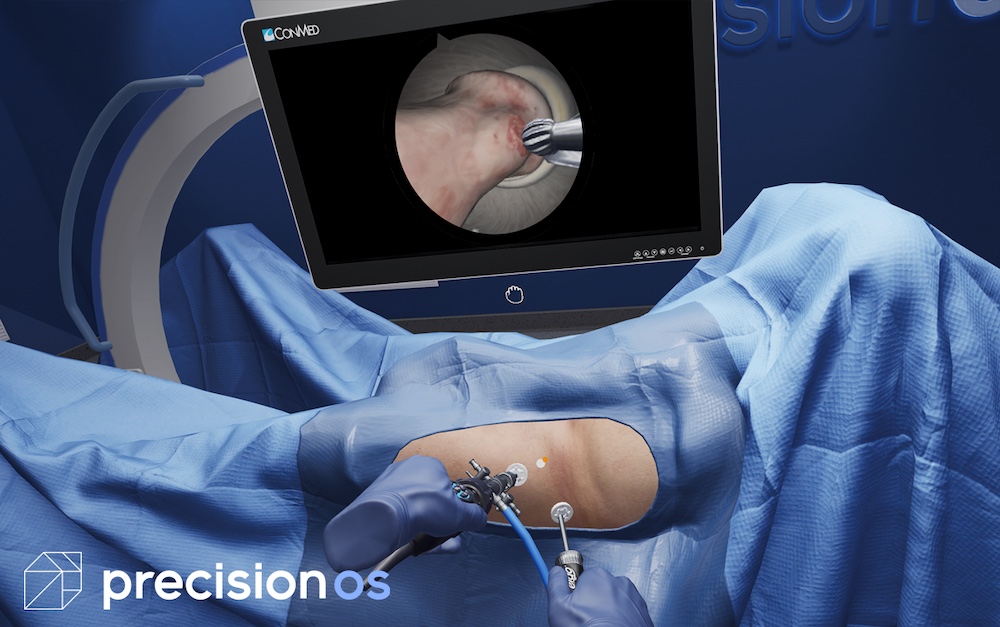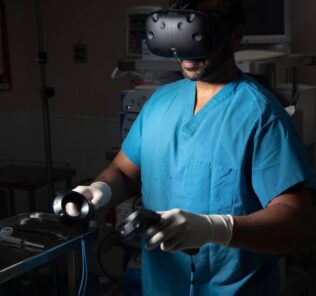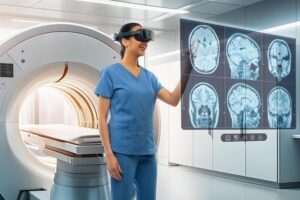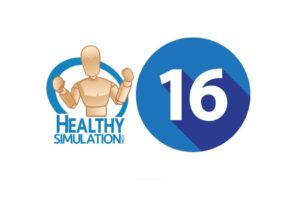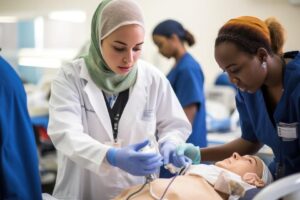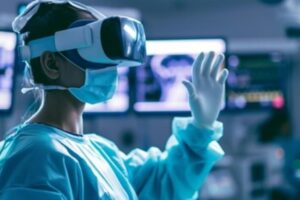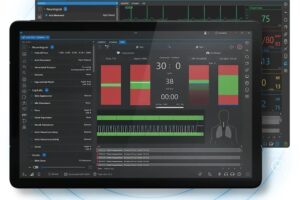Study Shows 50% Reduction in Critical Surgical Errors After PrecisionOS VR Healthcare Simulation Training
Immersive virtual reality healthcare simulation training modules are helping to drive the future of surgical simulation education. This is because numerous studies have found that traditional methods of surgical training among residents and fellows have not properly equipped these professionals with the knowledge and experience necessary to operate unsupervised. In particular, the JAMA Network Open recently published a unique trial for the use of virtual reality in surgery simulation training in December 2020.
During the JAMA Network Open study, researchers questioned “What is the quantifiable skill and knowledge transfer for surgical trainees using immersive virtual reality to learn both pathology recognition and complex procedural skills?” In response, they studied 18 senior orthopedic surgery residents from January 30 to February 1, 2020. The purpose of this data collection was to evaluate whether immersive virtual reality (IVR) improves learning effectiveness for surgical trainees and to validate a VR rating scale through correlation to real-world performance.
During the data collection, the IVR group received training on the PrecisionOS platform version 3.0. The PrecisionOS healthcare simulation software takes a comprehensive approach to the surgical process which includes patient preparedness/education for surgery, the surgeon (including all levels of trainees) and rehabilitation. Using this technology, the IVR module provides guided learning for key steps in the procedure and provides a composite Precision Score at the end of the module. The Precision Score is calculated based on several key parameters relevant to safe and successful implantation.
Sponsored Content:
From their study, researchers found that the surgery residents who trained using immersive virtual reality “demonstrated significant improvements in knowledge and procedural metrics compared with a control group receiving technical video instruction.” This was determined by identifying a demonstrated transfer effectiveness ratio of 0.79. These results indicate that immersive virtual reality substituted for 47.4 minutes of equivalent real operating room training.
Further, the IVR group completed training 387% faster considering a single repetition, and had significantly better mean (SD) OSATS scores than the control group. The IVR group additionally demonstrated higher mean (SD) verbal questioning scores, with the IVR score (i.e., Precision Score) strongly correlating to real-world OSATS scores and final implant position.
From this information, researchers were able to determine that a nearly 50% reduction in surgical errors resulted from when surgeons trained with PrecisionOS. Other findings included that VR training was able to reduce the learning curve by up to 50 cases. Helping to meet the need for better scaling methods and more effective skill transfer from device manufacturers to educational institutions, this usage substituted nearly an hour of actual surgical time, and is at a minimum 34x less expensive than traditional learning methods.
“At a 2019 projected valuation of just $337 million, the Surgical Simulation market is vastly under-appreciated,” said Taha Jangda, general partner at HealthX Ventures. “VR Surgery Training is scalable, cost-effective, and now shown to be highly effective in skill transfer. With COVID detouring surgical training, VR options from companies such as PrecisionOS will become the new training standard for decades to come.”
Sponsored Content:
According to the JAMA Network Open, the surgical simulation VR trial findings suggest that immersive virtual reality may play a significant role in the future of procedural training, supplementing and perhaps augmenting traditional teaching and effectively reducing early surgical learning curves. However, the study’s researchers note that further skill transfer must be studied to continue to demonstrate its value relative to real-life experiences. They believe that “given that traditional simulators rely on validated scoring metrics to determine effectiveness, the novelty of IVR should be validated by a similar metric.”
Today, PrecisionOS serves both sides of the surgical simulation training market. The company works with medical device companies to design safe and effective virtual reality in simulation education modules for produced devices, and deploys a VR-based surgical simulation curriculum to the institutions that train the next generation of surgeons.
“We have one priority at PrecisionOS: Create clinically-validated, educational software that makes it easier for surgeons to deliver better care. And to deliver this value with no patient risk and at major cost-savings. By pushing the limits of our high-fidelity simulations and testing our technology with peer-reviewed research, it’s clear that connecting people worldwide in the same virtual operating room is becoming harder to justify not using,” said Danny Goel, MD, and orthopedic surgeon and CEO of PrecisionOS.
This JAMA Network Open-published study was a randomized, intervention-controlled clinical trial of surgical residents to determine the effectiveness of IVR training in complex surgical skill acquisition. The study was approved by the Ottawa Health Science Network Research Ethics Board, and all participants provided written informed consent. The presented research followed all Consolidated Standards of Reporting Trials (CONSORT) reporting guidelines.
More About PrecisionOS
PrecisionOS is a virtual reality software company that brings medical-grade, interactive VR) and augmented reality (AR) experiences to surgical simulation training for physicians. The PrecisionOS platform delivers a lifelike experience that recreates what surgeons face in a real operating room. The solution includes human anatomy, surgical instruments, medical devices such as orthopedic implants and the operating theater itself. The realism extends to the freedom of movement and autonomous decisions that surgeons face in the actual OR — as opposed to other scripted simulations that guide the surgeon’s hand.
Medical institutions use the PrecisionOS platform to train both residents and practicing surgeons, and provide them with an effective training modality at a lower cost. The solution also reduces the time needed to produce surgeons who are confident, capable and ready to perform procedures on their own. Alternatively, medical device companies employ PrecisionOS VR technology to instruct practicing surgeons on implants and other devices they are bringing to market. They also train their sales representatives to become experts on devices, instruments and procedures so they can be an indispensable resource to the surgeons they support.
With software deployment in more than 300 cities across 25 countries, PrecisionOS now has the largest global distribution footprint in the industry. The company’s award-winning, wireless virtual reality system includes fully interactive and personalized joint reconstruction, robotics, trauma, spine, pediatrics, upper extremity and arthroscopy.
Learn More About PrecisionOS
Lance Baily, BA, EMT-B, is the Founder & CEO of HealthySimulation.com, which he started while serving as the Director of the Nevada System of Higher Education’s Clinical Simulation Center of Las Vegas back in 2010. Lance is also the Founder and acting Advisor to the Board of SimGHOSTS.org, the world’s only non-profit organization dedicated to supporting professionals operating healthcare simulation technologies. His co-edited Book: “Comprehensive Healthcare Simulation: Operations, Technology, and Innovative Practice” is cited as a key source for professional certification in the industry. Lance’s background also includes serving as a Simulation Technology Specialist for the LA Community College District, EMS fire fighting, Hollywood movie production, rescue diving, and global travel. He and his wife Abigail Baily, PhD live in Las Vegas, Nevada with their two amazing daughters.
Sponsored Content:



